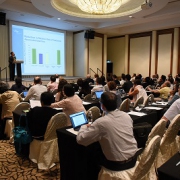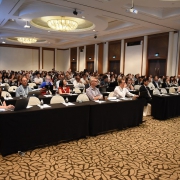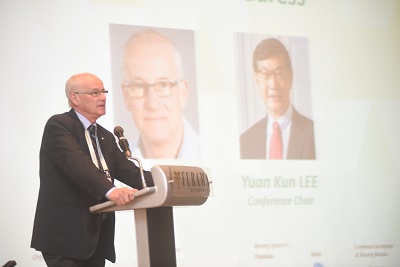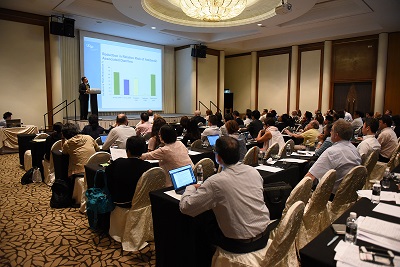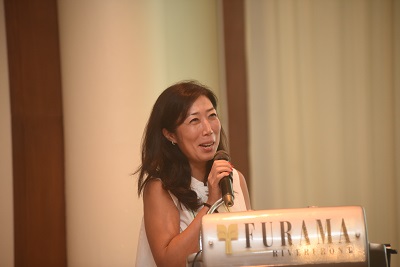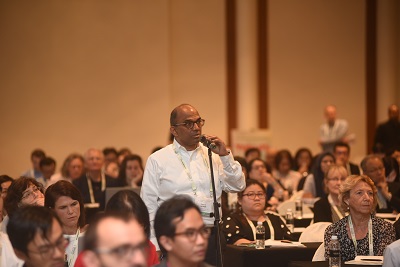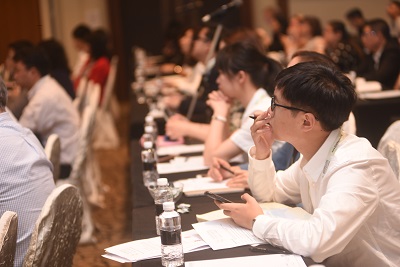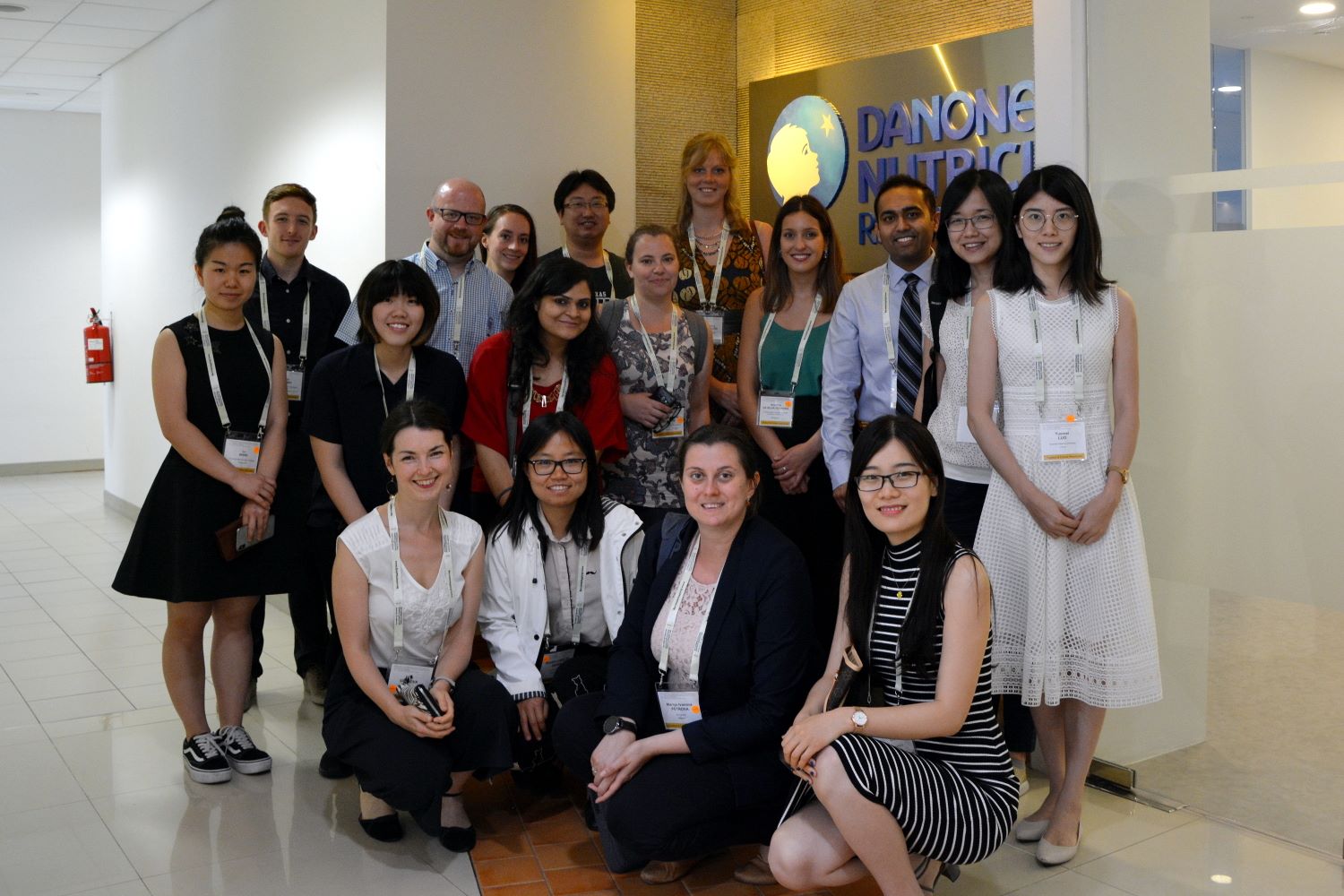East meets West at ISAPP’s first meeting in Asia
By Mary Ellen Sanders, PhD
The International Scientific Association for Probiotics and Prebiotics (ISAPP) recently convened its first meeting held in Asia, with the modern hub of Singapore as a host city. The meeting featured a two-day open registration meeting, attended by nearly 250 scientists, health professionals, and industry representatives, and a third day of smaller discussion groups by invitation. The meeting provided a rare opportunity for non-members to attend. It provided a dynamic forum for sharing different clinical experiences and regulatory nuances amongst the continents, as well as allowing attendees to better appreciate the research being performed in the Asian region.
Here are a few speaker highlights:
Mimi Tang MD
Tang presented the results of a double-blind, randomized controlled trial examining the effect of probiotic supplementation combined with oral immunotherapy (OIT) to decrease the risk of peanut allergy in children. Peanut allergy is one of the fastest growing food allergies in children. In the Probiotic and Peanut Oral ImmunoTherapy [PPOIT] study, children randomized to the intervention group had increased rates of sustained responsiveness to peanut several weeks after discontinuation of the treatment. Tang discussed the implications of the study, as well as current, larger clinical trials that are building upon these findings.
Dr. Bruno Pot
The Lactobacillus genus is taxonomically abnormally heterogeneous. Currently, the 231 Lactobacillus species range from a genome size of 1.23 – 4.91 megabases, have a GC content of 32-57% and an average nucleotide identity that is typical for a family or worse. Such ranges are far beyond what is acceptable for a bacterial genus. Experts are recommending that the current genus should be split into 12 new genera. Some well-known lactobacilli would be re-named, which may have important repercussions commercially and legally.
Profs. Colin Hill and Patrice Cani
Hill described how lactase in yogurt cultures improves lactose digestion; he emphasized how mechanisms that drive probiotic activity are complex. Some scientists are searching for a single molecule that drives probiotic health benefits—but it is unlikely to be found.
Hill noted even inactivated (non-living) microbes may have health effects—for example, a study showed that a dead Lactobacillus strain reduced anxious behavior, reduced cortisol levels, and impacted the microbiome in a mouse model. Work by Prof. Patrice Cani showed that heat-killed Akkermansia muciniphila were sufficient to ameliorate obesity and diabetes in mice. Does this suggest that we will need to start quantifying probiotics based on biomass as well as CFU?
Profs. Hani El-Nezami, Gregor Reid and Akihito Endo
These three speakers illustrated the important impact of environmental toxins (extremely potent aflatoxins, pesticides, and heavy metals) on humans and wildlife. They showed how certain probiotic strains can decrease aflatoxin absorption and even degrade them; sequester heavy metals and pesticides to reduce their uptake; and enhance resistance to honey bee colony collapse disorder that threatens the world’s food supply.
Prof. Wim Teughels
To date, 11 studies have been published on probiotics with a low ‘number needed to treat’ for prevention of dental caries in infants, toddlers, and adults. One study showed the benefits of administered L. reuteri, following children for nine years after they were treated as infants before any teeth had emerged. Also, data exist for probiotics influencing other oral health endpoints, including periodontal infections, oral candida infections, and halitosis.
The discussion groups on day three of the conference addressed a range of topics:
- Possibilities to harmonize global probiotic and prebiotic regulations—Chaired by Seppo Salminen (Finland), Yuan Kun Lee (Singapore), and Gabriel Vinderola (Argentina)
- Fermented foods for health: East meets West—Chaired by Bob Hutkins (USA), Paul Cotter (Ireland), and Liu Shao Quan (Singapore)
- Potential value of probiotics and prebiotics to treat or prevent serious medical issues in developing countries—Chaired by Daniel Merenstein (USA), Reuben Wong (Singapore), and Colin Hill (Ireland)
- Prebiotics as ingredients: How foods, fibres and delivery methods influence functionality—Chaired by Glenn Gibson (England) and Karen Scott (Scotland)
These workshops often produce peer-reviewed publications based on the discussion outcomes, so stay tuned for these developments. (See here for a list of ISAPP publications.)
The full meeting report is being developed and will be posted on the ISAPP website shortly.
The 2019 meeting will return to ISAPP’s normal format, hosted by Dr. Sarah Lebeer in Antwerp, Belgium.

